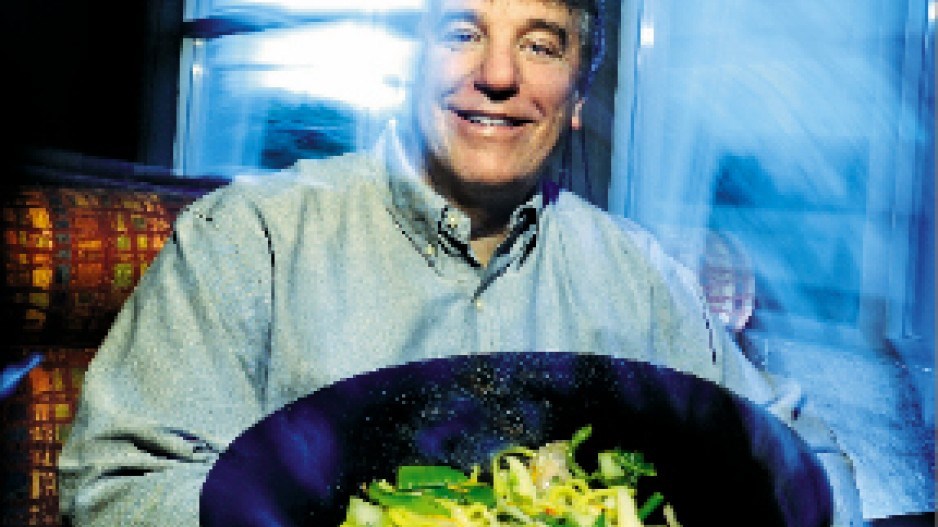Metro Vancouver’s large Asian population makes the city a natural location for the headquarters of Canada’s largest quick-service casual Asian restaurant chain.
However, the unusual thing about Surrey-based Wok Box’s growth strategy is that the 65-outlet company has avoided Canada’s largest cities and the diverse population associated with urban cores.
Founded in Edmonton in 2004, the venture increased gross sales to roughly $50 million last year by successfully expanding first to small towns such as Brandon, Manitoba, and Spruce Grove, Alberta.
The chain still has no restaurant in Vancouver. Instead, its Lower Mainland locations are in suburbs such as New Westminster, North Vancouver and South Surrey. Five of its nine B.C. restaurants are strategically placed outside the Lower Mainland.
“When you hit a small market, you can do your marketing cheaper – your radio and TV. You can make a presence quicker,” explained Wok Box CEO Scott Bender.
“If we can get to 100 stores and then go to the big metro centres, we’ll have the money for mass radio and TV. We want to have the ability to have more bang for our buck when we go in there.”
Four more B.C. Wok Box restaurants are set to open by next summer: a second location in Abbotsford and North Vancouver as well as initial stores in Chilliwack and Kelowna.
Bender owns Wok Box along with company founders Christian Bullockand Roger Newton, and he separately owns the four-location Gulliver’s Grillchain and a Cheesecake Caféfranchise – all in Western Canada.
Wok Box, which takes most of his time, is unlike other successful B.C.-based restaurant chains such as White Spot, A&W Food Services of Canada Inc. and Nando’s Canada because it’s 100% franchised.
White Spot uses its corporately owned locations to test new products. But Bender doesn’t believe that’s a sufficient reason to have corporately owned stores. He said plenty of franchisees are keen to test new products.
The company’s only current international franchise is in Beirut – a location that was approved because a persistent and capable franchisee passed rigorous due diligence and convinced Bender that he could successfully run the operation.
Much like 1-800-Got-Junk? owner Brian Scudamore, Bender saw the U.S. as the natural international place to expand. And like to Scudamore, he has learned how time consuming and intricate opening franchises in the U.S. can be. Each state has different disclosure laws, so separate documents need to be filed in each jurisdiction – a process that has so far taken eight months. Dealing with landlords is also different in the U.S., where Bender expects to soon open restaurants in Arizona, Oregon and Minnesota.
Canadian landlords attract tenants with free rent and cash to use on structural improvements. Bender said that more restricted bank lending in the U.S. means American landlords tend to give tenants longer periods of free rent.
Born and raised in Brandon, Manitoba, Bender came to B.C. in 1985 to attend Simon Fraser University and complete a BA in kinesiology.
The avid athlete had dreams of working in an sports-related career.
Running a successful business installing lawn sprinklers and underground irrigation systems in Brandon during summer semesters derailed those plans.
“Underground sprinklers were a new thing back then,” Bender said. “I think we did the whole city. We had a crew and worked until 10 p.m. or 11 p.m. each night.”
The enterprise helped him amass several hundred thousand dollars, but he saw it as unsustainable business.
Home Depot and Canadian Tire stores were popping up across Canada, and prospective clients soon learned that installing the sprinkler systems was relatively easy and it was far less expensive to do it themselves than to hire a company like Bender’s.
He opened a Kelsey’s franchise and operated that for several years before selling the business and building, with a partner, four Moxie’s Classic Grill restaurants – in White Rock, Surrey, New Westminster and Brandon. He stayed with Moxie’s until Northland Properties bought the parent company in 2003. Bender didn’t like the way Northland was changing the Moxie’s concept, so he sold his franchise and invested the proceeds into launching his Gulliver’s Grill restaurants and buying a Cheesecake Café franchise.
“He’s always looking for opportunities,” said Vino Mistry, Sysco Canada’s vice-president of business development and corporate sales.
Mistry has known Bender since he started supplying him with food for his Gulliver locations. “He’s not afraid to get into something new. Wox Box is a prime example of that. So was opening a franchise in Beirut.”
Bender was itching to try something that was outside his comfort zone when he met Wok Box’s founders in 2005. He opened the chain’s third franchise, in Brandon, in 2005 partly to prove that the concept could work in a smaller centre. He then did the required legwork to understand how to franchise and was rewarded with early franchisees who were willing to pay to be part of a relatively small operation.
His chain charges a $25,000 franchise fee that includes training and legal help. It also charges a 6% ongoing royalty and a 4% marketing allowance.
Growth has been spectacular.
The company had eight stores by early 2007. That jumped to:
•23 by early 2008;
•38 by early 2009;
•43 by early 2010; and
•52 by early 2011.
Bender moved the company’s head office to Surrey because he lives in nearby White Rock and he wanted to be close to the office. Initially, Wok Box had a cubby hole office that was little more than 500 square feet.
Bender then moved the franchisor’s head office to a 4,000-square-foot site in 2008. He has seven employees.
Wok Box has just started selling its bottled sauces in its stores. •




